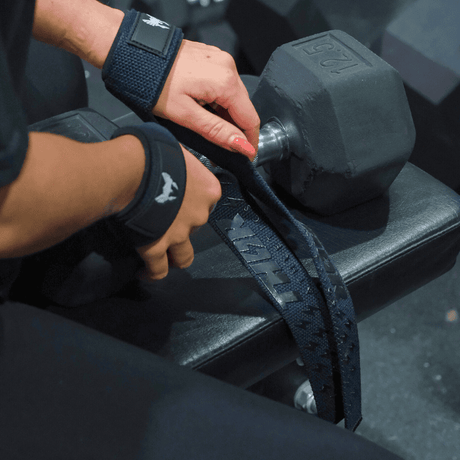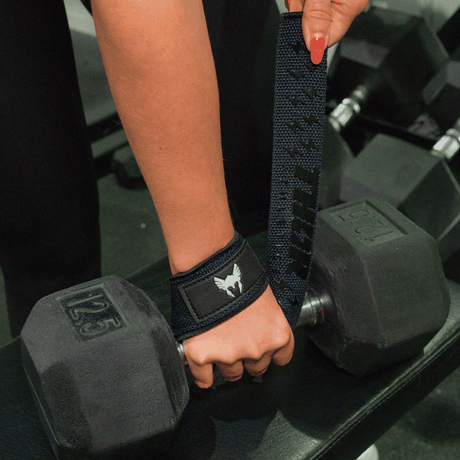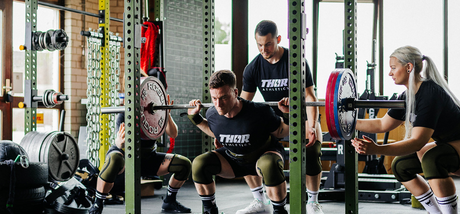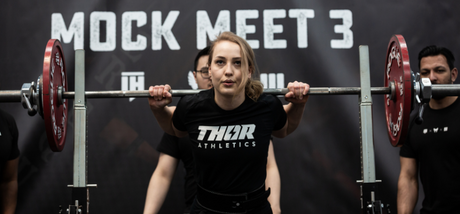In this article, you will get 5 lifestyle tips with which you can optimize recovery and accelerate muscle growth.
During training, muscles are broken down, after which they rebuild, strengthen, and grow. The actual growth therefore takes place during the recovery phase after the moment of training. It is important to optimize the recovery process. You do this by paying attention to sleep, nutrition, and stress, in other words, your lifestyle. Read all about recovery and accelerating muscle growth in this blog.
Why is recovery important for muscle growth?
Strength training, provided it is sufficiently heavy and challenging, influences hormone production and is a strain on muscle cells, the nervous system, and energy stores. It is important that these fatigue factors are recovered before the next training session. In this case, it is possible to progressively overload exercises, which is an essential condition for achieving muscle growth.
What progressive overload entails, you can discover here in this article.
To better understand the recovery principle, it is useful to take a look at the Fitness-Fatigue model in the image below:

Within this model, the blue performance line is important. This line indicates the extent to which you are able to perform. This line is influenced by fitness and fatigue.
Fitness is understood as the muscle mass and strength that the body could potentially deploy. Fatigue refers to the existing tiredness.
As you can see, the fitness variable increases immediately after completing the training. This is logical because muscle mass and strength grow directly after training. What prevents you from immediately benefiting from this increase is the fact that you are limited by fatigue.
When the accumulated fatigue is sufficiently recovered, you are ready to perform and able to benefit from the increase in fitness. This is known as supercompensation and opens the door to applying progressive overload.
"For various reasons, optimizing recovery will speed up your muscle growth."
For various reasons, optimizing recovery will speed up your muscle growth. First, you are physically and mentally ready to train again before the start of the next session. Additionally, you are better able to apply progressive overload. Third, all high threshold motor neurons can be fully activated again, which is essential for building muscle mass. Finally, recovery improves your load capacity, allowing you to handle more volume (sets per muscle group per training) and potentially achieve more growth.
A lack of recovery can even lead to a loss of muscle mass. Something strength athletes want to avoid at all times. In this article, you will get 5 lifestyle tips to speed up your recovery and muscle growth.
Tip 1: Sleep enough to promote muscle growth
One of the most important recovery factors for strength athletes is sleep. During the night, the brain is able to process stimuli and clear brain waste. Additionally, sleep is important for the renewal and recovery process of cells, including muscle cells. A lack of sleep is characterized by increased production of Cortisol and decreased production of hormones related to muscle growth. Finally, sleep is important for a well-functioning immune system, which also affects muscle recovery. Thus, sleep has a direct impact on your growth.
Strength athletes are recommended to sleep at least 7 hours per night. For strength athletes who train often and intensely, sleeping 10 hours per night can even be beneficial.
To further optimize recovery, it is advisable to go to bed and get up at the same time as much as possible. This improves sleep quality, partly because the sleep phases are better completed and deeper sleep is achieved.

Tip 2: Eat enough protein for recovery
Proteins are made up of amino acids and are important for building muscles, cells, and tissue. Additionally, the body uses proteins for the production of hormones, enzymes, hemoglobin, and energy. Finally, they support the body in initiating metabolic processes and have a signaling function. For muscle growth, the muscle-building function of proteins is especially important.
Throughout the day, the body breaks down and builds up muscle mass. Strength training accelerates this process. To increase the amount of muscle mass in your body, it is essential that your body has more protein available than is broken down. By eating enough protein, your body enters a positive protein balance.
But what is sufficient?
"It is important to realize that your body does not care much about proteins."
For strength athletes, a daily minimum of 1.6g of protein per kilogram of body weight applies.
A higher protein intake probably does not add much value for muscle growth.
It is important to realize that your body does not care much about proteins. What is important for the body is that the right amino acids are present at the right time and in the right amount. By adhering to the guideline mentioned above and choosing high-quality protein sources (proteins of animal origin), you can meet this requirement.
In addition to a minimum daily amount of protein, there is also a minimum for the amount of protein per meal. Based on research, it is recommended to consume at least 0.3g of protein

Tip 3: An appropriate nutrition schedule
Recovery and muscle building can be further promoted by an appropriate nutrition plan. A plan with the right number of calories, in which proteins are logically distributed over the meals to be eaten and sufficient fats, carbohydrates, vitamins, and minerals are included.
Strength athletes gain muscle mass most easily when they maintain a small calorie surplus (150-250 kcal) or lean bulk. Muscle growth is a process that requires a lot of energy. During bulking, the body has an energy surplus available. Additionally, eating a larger amount of calories leads to a stronger and longer-lasting insulin response. Both factors facilitate the growth process.
The body can further accelerate the growth process by strategically spreading protein intake throughout the day. It is wise to increase the protein content of the first meal, the post-workout meal, and the pre-bed meal. In the morning and after exercise, the body is in a phase of increased insulin sensitivity. During these times, the body can absorb proteins quickly and easily. Sleep is a phase of relatively long fasting. To provide the muscles with enough protein during this time, it is also smart to eat more protein before sleeping.
Fats
Contrary to the belief of many strength athletes, fats play an essential role in the growth and recovery process. The consumption of polyunsaturated and saturated fatty acids has a positive effect on anabolic hormone production. Additionally, omega-3 fatty acids have a positive effect on bodily inflammation levels, which promotes muscle mass recovery. Finally, fats have a positive effect on insulin sensitivity and possibly also on muscle protein synthesis.
So do not be afraid to include fats in your diet. For optimal physical functioning, it is recommended to allocate at least 20% of total calories to fats daily.
Additionally, it is wise to consume 0.2gr/kg body weight of omega-3 daily.
More about fats and their importance for muscle growth can be read in this article.
Carbohydrates
Carbohydrates have an important function for strength athletes. The macronutrient is broken down in the body into glucose, converted to glycogen, and stored in muscles among other places. Glycogen is mainly used by the body during higher intensity physical activity, such as strength training.
A meta-analysis by Eric Helms shows that a deficiency of carbohydrates in the diet can have a negative effect on muscle endurance and energy levels.
This can negatively affect workouts and results. Dr. Mike Israetel also often emphasizes the importance of carbohydrates for optimizing recovery and muscle growth. According to him, carbs have a positive effect on insulin production, the pump, anabolic effects, cortisol production, and they inhibit the adverse effects of high cortisol production.
Therefore, it is wise to always allocate a substantial part of the calories to carbohydrates to promote training results.

Vitamins
If you follow the above guidelines, eat a varied diet, with at least 2 servings of fruit and 500 grams of vegetables daily, then you have a relatively high-quality diet. But despite that, deficiencies in one or more vitamins and minerals can occur. In this case, it is wise to supplement them.
Important vitamins for strength athletes are vitamin D, omega-3, Creatine, and Magnesium.
Vitamin D plays a role in calcium absorption and is therefore important for the formation of strong bones. Additionally, vitamin D has an important role in muscle function and muscle protein synthesis. The intake of vitamin D may also have a positive effect on the functioning of mitochondria and enzymes in muscle cells and insulin sensitivity.
Finally, supplementation can lead to an increase in the size of muscle fibers. Positive effects can be observed with a daily intake of 5000IU or 125ug vitamin D.
The intake of omega-3 has a positive effect on bodily inflammation levels and muscle protein synthesis. Both are beneficial for the recovery and growth of muscle mass. Additionally, omega-3 fatty acids help prevent severe muscle damage.
Ensure a daily intake of 1-2g EPA and DHA, which corresponds to about 3 to 6 grams of fish oil, to experience positive effects. Good sources of fish oil include cod liver, salmon, trout, mackerel, and sardines.
One of the most used supplements among strength athletes is Creatine. This supplement provides the body with energy when oxygen supply is insufficient to produce the required energy (during anaerobic activities such as strength training). This way, muscle endurance is improved.
The use of Creatine has a positive effect on work capacity (the number of repetitions per set) and the ability to produce power. For maximum benefits, it is sufficient to take 2-5 grams of creatine daily. Taking more has no additional positive or negative effects. It is simply excreted in the urine.
Everything you need to know about Creatine can be found by clicking here.
Finally, Magnesium is a supplement that strength athletes can use because it is difficult to get enough of it. Magnesium ensures the functioning of muscles, bones, nerves, and the immune system. Additionally, magnesium plays an important role in the production and release of Insulin and maintaining the insulin sensitivity of cells. It also helps reduce depressive feelings and prevent low-grade inflammation. Lastly, the supplement has a positive effect on sleep quality.
Men are recommended to supplement daily with 400-420mg of Magnesium. For women, it is 300-310mg/day. If you sweat a lot during exercise, it may be wise to increase the dosage by 10-20%.
Tip 4: Avoid stress to speed up recovery and muscle growth
Besides muscle growth, stress has various adverse effects on bodily processes. In a stressful situation, the body produces glucocorticoids (stress) hormones. These hormones directly cause muscle mass breakdown and reduce the amount of muscle protein synthesis. Additionally, the production of hormones linked to muscle growth (Insulin, Testosterone, and IGF-1) is suppressed during periods of (chronic) stress.
"Fortunately, there are ways to minimize the adverse effect of stress on recovery."
The negative effects of stress hormones on muscle protein synthesis and hormone production have adverse consequences for the recovery process. Direct research on the effect of stress on recovery also shows that it delays the recovery process.
Fortunately, there are ways to minimize the adverse effects of stress on recovery. First, it is wise to avoid stress where possible. Additionally, meditation is a powerful tool to reduce stress. It also works well to regularly seek nature or express gratitude.
Despite the tips, stress can sometimes still get too high. In that case, it can work well to encourage yourself in the third person. It can also help to regain control over your thoughts by writing off the stress. Finally, meditation and nature are powerful tools in that case.
More about the effects of meditation can be found here.
Tip 5: Drink enough
Our body consists of about 60% water. Muscles also consist largely (75%) of water. As a strength athlete, it is therefore important to drink enough. Even a limited degree of dehydration can lead to headaches, fatigue, and a decline in mental and physical performance.
Water helps, among other things, to facilitate chemical reactions in the body, flush out waste products, maintain body temperature, and is important for the functioning of the nervous system.
Research shows that a lack of fluids during training leads to an increase in Cortisol and a decrease in Testosterone production. This has adverse effects on recovery and muscle growth.
It is too random to give advice on drinking an absolute amount of water. Instead, it is wiser to drink according to thirst. Signals such as a feeling of thirst, a dry mouth, and dark or smelly urine are signs that the body is asking for fluids.
Want to get the most out of yourself and your physique? In my e-book A Life Full of Growth, you receive 12 practical tips to work on a powerful physique, a strong lifestyle, and an indestructible mindset. With this e-book, you come into the power of your life, for a life full of growth on all fronts. Click here to download the E-Book.
Hopefully you found this blog helpful; if you have any questions, you can always contact me on instagram or via the website
Regards,
Wesley











































